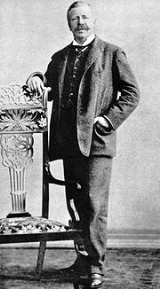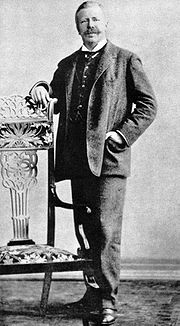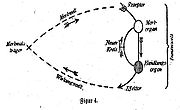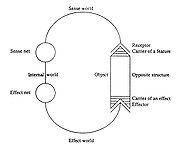
Jakob von Uexküll
Encyclopedia




Jakob Johann von Uexküll (8 September 1864 - 25 July 1944) was a Estonian
Governorate of Estonia
The Governorate of Estonia or Estland, also known as the Government of Estonia or Province of Estonia, was a governorate of the Russian Empire in what is now northern Estonia.-Historical overview:...
biologist who worked in the fields of muscular physiology
Physiology
Physiology is the science of the function of living systems. This includes how organisms, organ systems, organs, cells, and bio-molecules carry out the chemical or physical functions that exist in a living system. The highest honor awarded in physiology is the Nobel Prize in Physiology or...
, animal behaviour studies, and the cybernetics
Cybernetics
Cybernetics is the interdisciplinary study of the structure of regulatory systems. Cybernetics is closely related to information theory, control theory and systems theory, at least in its first-order form...
of life
Life
Life is a characteristic that distinguishes objects that have signaling and self-sustaining processes from those that do not, either because such functions have ceased , or else because they lack such functions and are classified as inanimate...
. However, his most notable contribution is the notion of umwelt
Umwelt
According to Jakob von Uexküll and Thomas A. Sebeok, umwelt is the "biological foundations that lie at the very epicenter of the study of both communication and signification in the human [and non-human] animal." The term is usually translated as "self-centered world"...
, used by semiotician
Semiotics
Semiotics, also called semiotic studies or semiology, is the study of signs and sign processes , indication, designation, likeness, analogy, metaphor, symbolism, signification, and communication...
Thomas Sebeok
Thomas Sebeok
Thomas Albert Sebeok was a polymathic American semiotician and linguist.- Life and work :...
. His works established Biosemiotics
Biosemiotics
Biosemiotics is a growing field that studies the production, action and interpretation of signs in the biological realm...
.
Early life
Jakob von Uexküll was born in the Keblaste estate, Mihkli Parish, Estonia. According to Giorgio AgambenGiorgio Agamben
Giorgio Agamben is an Italian political philosopher best known for his work investigating the concepts of the state of exception and homo sacer....
, Uexküll was a baron
Baron
Baron is a title of nobility. The word baron comes from Old French baron, itself from Old High German and Latin baro meaning " man, warrior"; it merged with cognate Old English beorn meaning "nobleman"...
before his family lost most of their fortune in World War I
World War I
World War I , which was predominantly called the World War or the Great War from its occurrence until 1939, and the First World War or World War I thereafter, was a major war centred in Europe that began on 28 July 1914 and lasted until 11 November 1918...
, although Uexküll managed to retain a villa on Capri
Capri
Capri is an Italian island in the Tyrrhenian Sea off the Sorrentine Peninsula, on the south side of the Gulf of Naples, in the Campania region of Southern Italy...
where the critic, historian and philosopher Walter Benjamin
Walter Benjamin
Walter Bendix Schönflies Benjamin was a German-Jewish intellectual, who functioned variously as a literary critic, philosopher, sociologist, translator, radio broadcaster and essayist...
stayed for some time. Needing to support himself, Uexküll took a job as professor at the University of Hamburg
University of Hamburg
The University of Hamburg is a university in Hamburg, Germany. It was founded on 28 March 1919 by Wilhelm Stern and others. It grew out of the previous Allgemeines Vorlesungswesen and the Kolonialinstitut as well as the Akademisches Gymnasium. There are around 38,000 students as of the start of...
where he founded the Institut für Umweltforschung.
Uexküll was interested in how living beings subjectively perceive
Perception
Perception is the process of attaining awareness or understanding of the environment by organizing and interpreting sensory information. All perception involves signals in the nervous system, which in turn result from physical stimulation of the sense organs...
their environment
Natural environment
The natural environment encompasses all living and non-living things occurring naturally on Earth or some region thereof. It is an environment that encompasses the interaction of all living species....
(s). Uexküll called these subjective
Subjectivity
Subjectivity refers to the subject and his or her perspective, feelings, beliefs, and desires. In philosophy, the term is usually contrasted with objectivity.-Qualia:...
spatio-temporal worlds umwelt (German for environment). These umwelten are distinctive from what Uexküll termed the "umgebung" which would be objective
Objective
Objective may refer to:* Objective , to achieve a final set of actions within a given military operation* Objective pronoun, a pronoun as the target of a verb* Objective , an element in a camera or microscope...
reality should such a reality exist.
Umwelt
Uexküll's writings show a specific interest in the various worlds that he believed to exist ('conceptually') from the point of view of the Umwelt of different creatures such as tickTick
Ticks are small arachnids in the order Ixodida, along with mites, constitute the subclass Acarina. Ticks are ectoparasites , living by hematophagy on the blood of mammals, birds, and sometimes reptiles and amphibians...
s, sea urchin
Sea urchin
Sea urchins or urchins are small, spiny, globular animals which, with their close kin, such as sand dollars, constitute the class Echinoidea of the echinoderm phylum. They inhabit all oceans. Their shell, or "test", is round and spiny, typically from across. Common colors include black and dull...
s, amoebae, jellyfish
Jellyfish
Jellyfish are free-swimming members of the phylum Cnidaria. Medusa is another word for jellyfish, and refers to any free-swimming jellyfish stages in the phylum Cnidaria...
and sea worms.
The biosemiotic turn in Jakob von Uexküll's analysis occurs in his discussion of the animal's relationship with its environment. The umwelt is for him an environment-world which is (according to Agamben), "constituted by a more or less broad series of elements [called] "carriers of significance" or "marks" which are the only things that interest the animal". Agamben goes on to paraphrase one example from Uexküll's discussion of a tick, saying,
"...this eyeless animal finds the way to her watchpoint [at the top of a tall blade of grass] with the help of only its skin’s general sensitivity to light. The approach of her prey becomes apparent to this blind and deaf bandit only through her sense of smell. The odor of butyric acid, which emanates from the sebaceous follicles of all mammals, works on the tick as a signal that causes her to abandon her post (on top of the blade of grass/bush) and fall blindly downward toward her prey. If she is fortunate enough to fall on something warm (which she perceives by means of an organ sensible to a precise temperature) then she has attained her prey, the warm-blooded animal, and thereafter needs only the help of her sense of touch to find the least hairy spot possible and embed herself up to her head in the cutaneous tissue of her prey. She can now slowly suck up a stream of warm blood."
Thus, for the tick, the umwelt is reduced to only three (biosemiotic) carriers of significance: (1) The odor
Odor
An odor or odour is caused by one or more volatilized chemical compounds, generally at a very low concentration, that humans or other animals perceive by the sense of olfaction. Odors are also commonly called scents, which can refer to both pleasant and unpleasant odors...
of butyric acid
Butyric acid
Butyric acid , also known under the systematic name butanoic acid, is a carboxylic acid with the structural formula CH3CH2CH2-COOH. Salts and esters of butyric acid are known as butyrates or butanoates...
, which emanates from the sebaceous follicles of all mammals, (2) The temperature
Temperature
Temperature is a physical property of matter that quantitatively expresses the common notions of hot and cold. Objects of low temperature are cold, while various degrees of higher temperatures are referred to as warm or hot...
of 37 degrees celsius (corresponding to the blood
Blood
Blood is a specialized bodily fluid in animals that delivers necessary substances such as nutrients and oxygen to the cells and transports metabolic waste products away from those same cells....
of all mammals), (3) The hairy typology
Typology
Typology is the study of types. More specifically, it may refer to:*Typology , division of culture by races*Typology , classification of things according to their characteristics...
of mammals.
Influence
Works by scholars such as Kalevi KullKalevi Kull
Kalevi Kull is an eminent biosemiotics professor at the University of Tartu, Estonia.He was the president of the Estonian Naturalists' Society in 1991–1994.Ecologist Olevi Kull was his younger brother.-Publications:...
connect Uexküll's studies with some areas of philosophy
Philosophy
Philosophy is the study of general and fundamental problems, such as those connected with existence, knowledge, values, reason, mind, and language. Philosophy is distinguished from other ways of addressing such problems by its critical, generally systematic approach and its reliance on rational...
such as phenomenology and hermeneutics. Jakob von Uexküll is also considered a pioneer of semiotic
Semiotics
Semiotics, also called semiotic studies or semiology, is the study of signs and sign processes , indication, designation, likeness, analogy, metaphor, symbolism, signification, and communication...
biology, or biosemiotics
Biosemiotics
Biosemiotics is a growing field that studies the production, action and interpretation of signs in the biological realm...
. However despite his influence (on the work of philosophers Max Scheler
Max Scheler
Max Scheler was a German philosopher known for his work in phenomenology, ethics, and philosophical anthropology...
, Ernst Cassirer
Ernst Cassirer
Ernst Cassirer was a German philosopher. He was one of the major figures in the development of philosophical idealism in the first half of the 20th century...
, Martin Heidegger
Martin Heidegger
Martin Heidegger was a German philosopher known for his existential and phenomenological explorations of the "question of Being."...
, Maurice Merleau-Ponty
Maurice Merleau-Ponty
Maurice Merleau-Ponty was a French phenomenological philosopher, strongly influenced by Karl Marx, Edmund Husserl and Martin Heidegger in addition to being closely associated with Jean-Paul Sartre and Simone de Beauvoir...
, Gilles Deleuze
Gilles Deleuze
Gilles Deleuze , was a French philosopher who, from the early 1960s until his death, wrote influentially on philosophy, literature, film, and fine art. His most popular works were the two volumes of Capitalism and Schizophrenia: Anti-Oedipus and A Thousand Plateaus , both co-written with Félix...
and Félix Guattari
Félix Guattari
Pierre-Félix Guattari was a French militant, an institutional psychotherapist, philosopher, and semiotician; he founded both schizoanalysis and ecosophy...
(in their A Thousand Plateaus
A Thousand Plateaus
A Thousand Plateaus is the second book of Capitalism and Schizophrenia, the first being Anti-Oedipus. Written by Gilles Deleuze and Félix Guattari, it was translated into English by Brian Massumi...
), for example) he is still not widely known, and his books are mostly out of print in German and in English, although a paperback French translation of Streifzüge durch die Umwelten von Tieren und Menschen [A stroll through the Umwelten of animals and humans] is currently in print. This book has been translated in English as well as A Foray into the Worlds of Animals and Humans. with A Theory of Meaning. Jakob von Uexküll Translated by Joseph D. O'Neil Introduction by Dorion Sagan (UMinn Press, 2011).
Family
His son was biologist Thure von UexküllThure von Uexküll
Thure von Uexküll was a German scholar of psychosomatic medicine and biosemiotics. He has developed the approach of his father, Jakob von Uexküll, in the study of living systems and applied it in medicine.-Life:1955-1965: Director of the Medical Outpatient Department at the University of...
. His grandson is the writer Jakob von Uexkull
Jakob von Uexkull
Jakob von Uexkull is a writer, lecturer, philanthropist, activist and former politician. He served as a Member of the European Parliament 1987–1989, representing the German Green Party. In 1980, Uexkull founded the Right Livelihood Award, commonly known as the Alternative Nobel Prize, and in 2006,...
.
External links
- http://www.zbi.ee/~uexkull/Jakob von Uexküll centreJakob von Uexküll CentreJakob von Uexküll Centre is an Estonia-based organisation for the work with the heritage of biologist Jakob von Uexküll.It was established in 1993. The Centre is situated in Tartu and attached to the Estonian Naturalists' Society. The Centre co-works with the Department of Semiotics of the...
in Estonia] - Jakob von Uexküll
- Jakob von Uexküll, Institute for theoretical biology, biocybernetics and biosemiotics at the university of Hamburg
- Jakob von Uexküll, Theoretical Biology, Biocybernetics and Biosemiotics (Journal article)
- Jakob von Uexküll and his "Institut für Umweltforschung in Hamburg" (PPT - Presentation)

